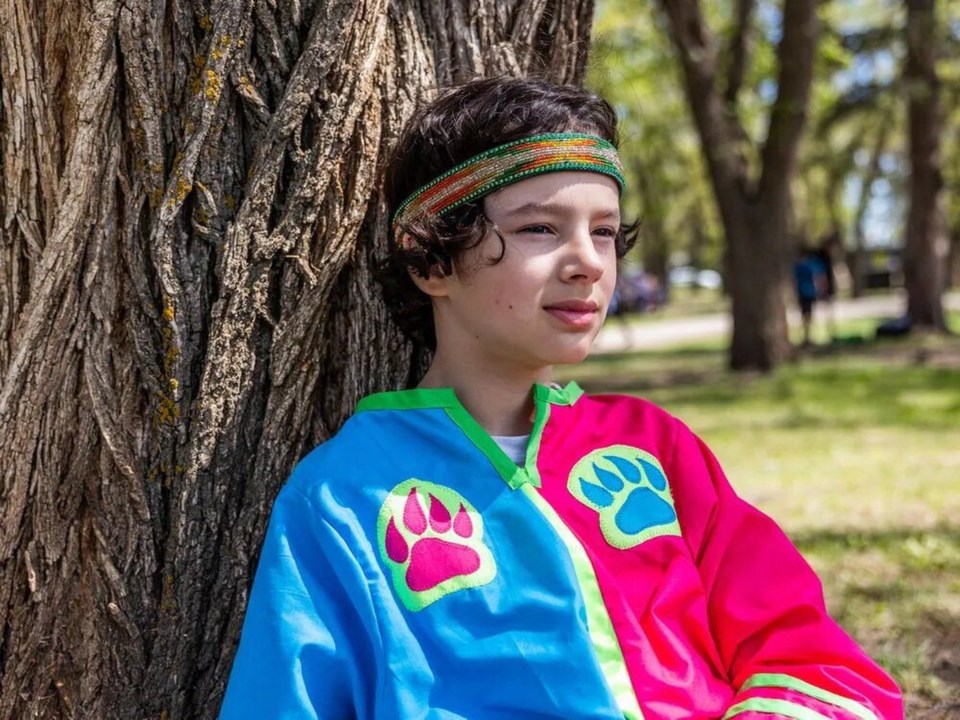PRINCE ALBERT - Under a big red and white striped awning in Kinsmen Park, Prince Albert, before thousands of spectators, 11-year-old Arius Toews put on his jingle dress and danced in his first powwow.
When he dances, he says, “I feel open and free.”
And С����Ƶ in the circle for the first time was like “feeling my dreams coming true.”
Toews, who is two-spirit, was excited to showcase his identity in his regalia — a pink and blue dress to represent masculinity and femininity. The dress also had a pink bear paw print sewn onto the blue half of the dress and a blue paw print in the pink half to represent the places where those spirits overlap.
“Being two-spirit feels very good,” he said.
This year, organizers of the Heart of the Youth Community powwow wanted to make it easier for children like Arius to feel welcome and safe in the circle.
To do that, they got rid of their gendered dance categories. The dances themselves didn’t change — jingle dancers still danced in the jingle category, and fancy dancers still danced fancy shawl or fancy bustle. But none of the categories were introduced as ‘men’s’ or ‘women’s’ dances.
Two-spirit Elder Marjorie Beaucage said this change is one of the ways the powwow has become more inclusive.
“All of the dancers don’t have to be men or women,” she said. “They can just be dancers — they don’t have to have labels. And that way, everybody can take their place.”
She also emphasized thoughtful and respectful language.
“I just want to remind everybody, there’s room for everybody in the circle,” she said at the start of the powwow, which took place on May 27.
But in the recent past, she says two-spirit dancers have faced stigma, sexism and hurtful jokes on the powwow circuit — which is a loss for the whole community.
“People have gifts, and the dances are for healing — especially the jingle dress; it’s a healing dance for the people,” she said. “And two-spirits carry a very special medicine.
“So for them to be able to dance the jingle is really special, and makes medicine to balance the circle.”
The Heart of the Youth powwow began in 2018, and was cancelled in 2020 due to COVID-19 and held virtually in 2021.
On the morning of its first in-person powwow in two years, Elder Liz Settee, one of the lead organizers, said the energy in the park was “indescribable.”
“I’m excited,” she said. “I’m amazed. I’m in awe. I’m feeling blessed that the weather has cooperated. I’m feeling grateful. I’m feeling humbled — and I don’t even know what else I’m feeling. I’m just a wave of emotions; I could break down crying any minute, I’m so happy.”
However, though the powwow has been missed immensely, Settee says the last two years have provided an opportunity for the organizing committee to work on inclusion.
For example, the powwow featured the Pride Flag in the grand entrance in 2019 but was still separating dancers out by gender — which didn’t sit right for Settee.
“Anything you do, you do properly,” she said. “That’s what my dad said — if you’re not going to do it right, don’t do it at all. And it just didn’t fit to show the flag, but not do the action with it. So we felt it was very important to do the action.”
Settee had a message for any two-spirit dancer who might want to join the circle at next year’s powwow.
“You are more than welcome to the powwow to dance in any category you feel comfortable in,” she said. “You have gifts and you have talents — come out and showcase them. …
“[And] stick with С����Ƶ yourself. That’s how Creator gifted you, and Creator does not make junk.”
At the start of this year’s powwow, seven-year-old Hudson Penner was beaming as she carried the Pride Flag in the grand entrance.
Hudson, who is also two-spirit, has been dancing fancy shawl since she was five years old.
Going to powwows “makes us feel good … in our heart,” she said.
Her mother, Jade Penner, was glad to see that the powwow had dropped its gendered categories this year.
Penner says inclusive powwows are part of creating a “safe world” for Hudson, where she can celebrate her culture and community and skills with nothing but joy.
“It doesn’t exclude her,” said Penner. “When it’s just ‘fancy shawl,’ and that’s what she dances and that’s what she enjoys doing, it makes her feel better.
“It makes her feel like there’s no barriers, there’s no stigma, and she can just go out there and be herself.”




